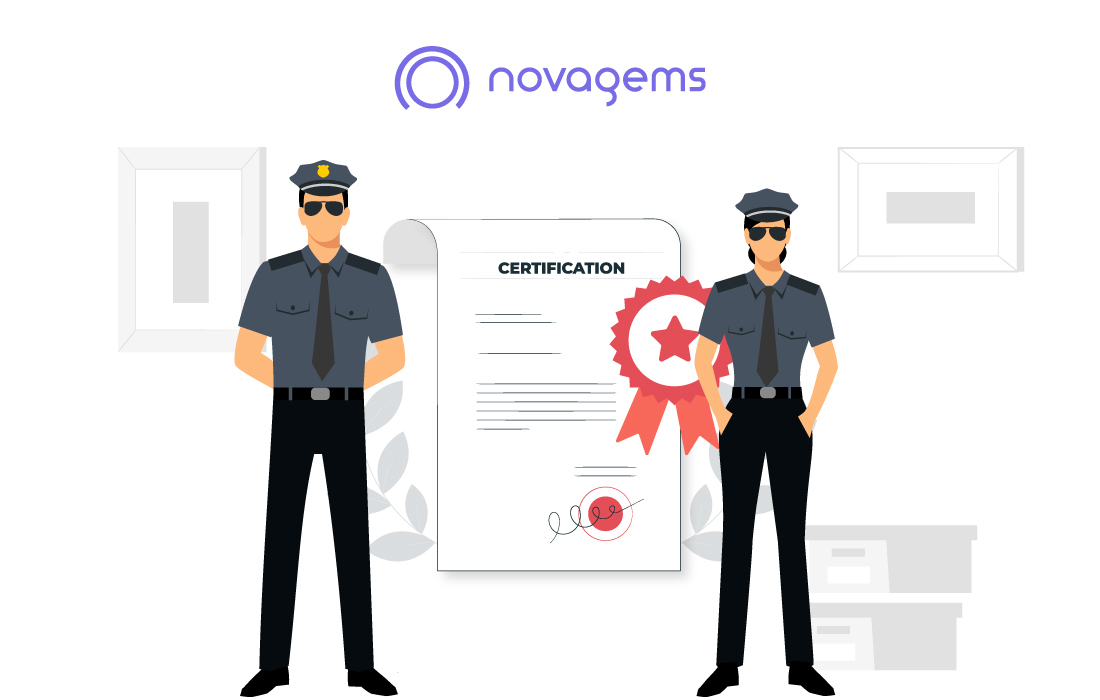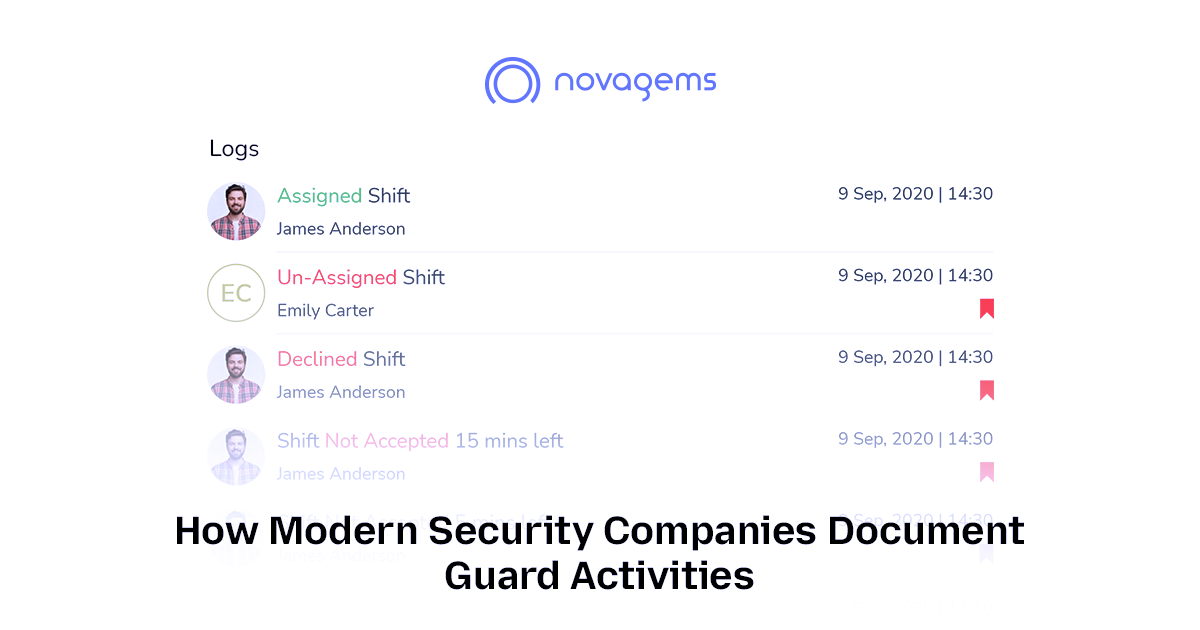4 Important Certifications Security Guards Must Have
Published on: Mon, Aug 29, 2022
Read in 13 minutes

Security guards are the first line of defense in protecting people, property, and assets. While the job demands vigilance, professionalism, and integrity, having the right certifications for security guards is equally important. Security guard certifications not only enhance the credibility of a security guard but also ensure they are equipped with the knowledge and skills to handle various situations effectively.
In this blog, we will explore the four essential security guard certifications, the benefits of each, and how they can elevate your career in the security industry.
Key Takeaways
- Certifications for security guards play a crucial role by ensuring proper training and industry recognition.
- The four most important security guard certifications are CPR and First Aid, Fire Safety, Weapons Training, and Specialized Certifications for specific industries.
- Well-certified security guards have better career opportunities and enhanced professional credibility.
Why Are Certifications Important for Security Guards?
Security guards are responsible for more than just monitoring a site—they must handle emergencies, prevent incidents, and ensure that all safety protocols are followed. With the right security guard certifications, they can perform these tasks efficiently and professionally.
According to the U.S. Bureau of Labor Statistics, the demand for private security is expected to grow by 6% over the next decade, outpacing the average for other occupations. This growth underscores the need for well-trained security guards who can respond quickly and effectively to different situations. One way to stand out in this competitive field is by holding the proper security guard certifications.
The below security guard certifications are a must for any security guard:
Physical Security Certification (PSC)
The Physical Security Certification (PSC) is for people who work in important places like the government or military, where they need to protect buildings, people, and valuable information. This security officer certification proves that you know how to keep places secure by using things like security cameras, alarms, and access control systems.
- Eligibility Requirements: To get this physical security certificate, you usually need experience working in security. Especially in government or military roles.
- Certification Focus: You’ll learn how to control who can enter a building, set up security systems, protect important areas, and respond to security threats.
- Examination: You need to pass a test that checks your knowledge of physical security practices.
- Maintenance: After getting this certification, you must renew it every three years by continuing your education and staying updated on new security methods.
Certified Lodging Security Officer (CLSO)
The Certified Lodging Security Officer certificate is for security guards who work in places like hotels, resorts, or other places where people stay overnight. This security industry certification teaches you how to keep guests safe, protect their belongings, and handle emergencies in a lodging environment.
- Eligibility Requirements: While there are no strict requirements. It’s helpful if you have some experience in hotel or lodging security.
- Certification Focus: The training covers how to ensure guest safety. And deal with emergencies like fires or medical issues, and protect the property from theft or damage.
- Examination: You’ll need to complete online training and pass a test to earn this certification.
- Maintenance: There’s no specific recertification process. However, it’s important to keep learning new skills and stay updated on the latest safety practices.
Certified Protection Officer (CPO)
The Certified Protection Officer (CPO) certification is a well-known and respected certification for security guards who want to improve their skills and knowledge. It’s suitable for both beginners and those with some experience in the security field.
- Eligibility Requirements: This certification is open to anyone interested in security, though having some background in security can help.
- Certification Focus: You’ll learn a wide range of topics. Those include how to manage security operations, protect assets like buildings and equipment, respond to emergencies, and understand the ethical responsibilities of a security officer.
- Examination: To earn the CPO certification, you must study the course materials and pass an exam.
- Maintenance: The certification is valid for two years, and you’ll need to keep learning and possibly take refresher courses to maintain it.
Associate Protection Professional (APP)
The Associate Protection Professional (APP) certification is for people who are just starting their careers in security management and want to prove that they have a solid understanding of the field.
- Eligibility Requirements: Depending on your education level, you need 1 to 4 years of experience in security management to qualify for this certification.
- Certification Focus: The APP covers four main areas: basic security principles, business operations, managing risks, and responding to emergencies.
- Examination: You’ll need to pass a comprehensive exam that tests your knowledge in these areas.
- Maintenance: This certification must be renewed every three years. This means you’ll need to continue learning and earning credits through professional development activities.
Below are some more security guard certifications that are needed:
Certified Protection Professional (CPP)
The Certified Protection Professional (CPP) is a top-level certification for experienced security managers. It’s one of the most respected certifications in the security industry and shows that you have expert knowledge in all areas of security. Hence all certified security guards aim to have this certification with them.
- Eligibility Requirements: You need at least 5 to 7 years of experience in security, including at least 3 years in a management role, to be eligible for the CPP.
- Certification Focus: The CPP covers a broad range of topics, including managing security teams, and protecting sensitive information. And ensuring physical security, conducting investigations, and handling crises.
- Examination: The exam for the CPP is difficult and tests your knowledge across these many areas.
- Maintenance: To keep your CPP certification, you must renew it every three years by continuing your education, participating in professional activities, and staying current with the latest security practices.
These are some of the main and important certificates every security guard must have. Below are are some more that you can consider-
Unarmed & Armed Security Officer Certification
If you are looking for ways to enhance your security competence, the Unarmed & Armed Security Officer Certification is ideal. The physical security certification enables you to leverage guidance from the finest training experts in the security industry. Besides, the program presents an excellent opportunity to get certified with unarmed training of just 24 hours of classroom instructions.
But besides that, they also get armed training that includes 6 hours of range instruction and 6 hours of classroom instruction. Following this, trainees will have to undergo a final exam evaluating their competence level. Trainees will also get certification in CPR, First Aid, and AED.
As a result, you get a broad understanding of different subjects in the security industry, further enhancing your chances of getting desirable employment. After completing this physical security certification program, you will have mastered security ethics, patrol techniques, and legal responsibilities, among many other skills.
American Society for Industrial Security (ASIS) Certification
Before enrolling with the ASIS certification, you must understand that the certification is not directly related to the security industry. But being a member of the American Society for Industrial Security (ASIS) or simply having a certification can be very beneficial.
Enrolling in this program will allow you to learn the latest tactics for ensuring unmatched security for people in the service-oriented industry. Additionally, the program will teach you about general principles and standards of the security industry to enhance your security skills. Besides that, you will also learn specific information associated with dealing with complex scenarios in the most effective manner.
Once you become a certified member of ASIS, you automatically become a designated professional ready to serve the security industry. Even better, the perks of this security guard certification are not just limited to the US and Canada but also to the international market.
Protection, Security, and Investigation
The Protection, Security, and Investigation program is a two-year diploma program by Niagara College Canada. The intent behind the launch of this program was to equip candidates with a rewarding and distinctive career in the security industry. By the end of the program, graduates will have the better critical thinking, interviewing, and researching skills.
The entire curriculum is designed in line with the modern security requirements of businesses in the 21st century. In this physical security certification, you will learn more about responding to potential threats in the most effective manner possible. But most importantly, you come out with a robust foundation to add value to your security guard industry.
With the Protection, Security, and Investigation program, trainees get training from veteran police officers with practical knowledge about the real world. Thus, this practical approach plays a key role in enhancing the overall efficacy. Additionally, it also opens many doors for your employment in the security industry, ensuring you always stand out in the crowd.
Basic Security Officer Training (BSOT)
The Basic Security Officer Training (BSOT) certification is a must-have for everyone interested in building a career in the security guard industry. Modeled around the Canadian General Standards Board Curriculum, BSOT is a 40-hour course. In these mere 40 hours, you will have the opportunity to learn every basic about becoming a security guard officer.
The Basic Security Officer Training (BSOT) program covers many basic security skills and tactics. These tactics include emergency response procedures, patrolling, fire safety, law, and more. Under this physical security certification, different security guards will receive different forms of training to ensure their skills match the requirements of the industry they intend to serve.
CPR and First Aid Certification
Whether it’s a medical emergency or an injury on the premises, knowing how to respond quickly and effectively is vital for any security guard. CPR (Cardiopulmonary Resuscitation) and First Aid certification for security guards are essential certifications that security guards should acquire to handle emergencies.
Why It’s Important:
- Emergency Response: CPR and First Aid certification ensure guards are prepared to provide immediate medical assistance until professional help arrives.
- Saves Lives: A security guard with CPR training can be the difference between life and death, especially in critical situations like heart attacks, drownings, or choking incidents.
Real-Life Statistics:
According to a study by the American Heart Association (AHA), 70% of people who suffer cardiac arrest outside of a hospital die, but survival rates increase by two to three times when immediate CPR is administered. These statistics highlight how vital CPR knowledge is, especially for security guards who may be the first to respond in emergencies.
Fire Safety Certification
Fire safety certification is another crucial aspect of security guard training. Whether working in commercial buildings, schools, or industrial sites, security guards must be equipped to handle fire emergencies. Fire safety certification for security guards ensures that guards can act quickly and appropriately in case of a fire emergency.
Why It’s Important:
- Preventing Fires: Guards trained in fire safety can identify potential hazards before they become major issues.
- Evacuation Procedures: A certified guard knows the proper procedures for evacuating people safely in the event of a fire.
- Fire Extinguisher Use: Guards are often responsible for ensuring fire extinguishers are in place and know how to use them effectively in the event of a small fire.
Real-Life Statistics:
A report from the National Fire Protection Association (NFPA) states that security guards are often the first responders in fire-related incidents. In fact, 72% of all fire-related fatalities occur in non-residential buildings, underscoring the importance of fire safety knowledge for security guards.
Weapons Training Certification
For security guards working in environments that require the use of weapons, such as armed security, obtaining the proper weapons training certification is essential. This ensures guards understand how to handle firearms safely and use them when necessary.
Why It’s Important:
- Safe Handling: Weapons training for security guards teaches them how to handle firearms responsibly and safely.
- Use of Force: Guards are educated on when to use force and how to de-escalate situations before reaching the point where weapons are needed.
- Legal Compliance: Proper training ensures guards meet the legal requirements for carrying and using firearms in various jurisdictions.
Real-Life Statistics:
According to the U.S. Bureau of Labor Statistics, approximately 25% of all security guards work in armed security. This makes weapons training crucial for those employed in such roles, ensuring they can handle potential threats appropriately while maintaining public safety.
Specialized Certifications for Specific Industries
Many security guards work in specialized settings, such as hospitals, airports, or government buildings. In these cases, specific industry certifications are necessary. These specialized certifications for security guards ensure that security guards are equipped to handle unique challenges in their specific field.
Why It’s Important:
- Industry-Specific Knowledge: For example, airport security guards need to understand the protocols for screening passengers and luggage, while hospital security guards must handle patient confidentiality and safety protocols.
- Enhanced Career Opportunities: Specializing in a niche area, such as private investigator certification or crowd control management, opens up more career opportunities for security professionals.
Examples of Specialized Certifications:
- Hospital Security Certification: Trains guards to handle situations like violent patients, medical emergencies, and visitor management.
- Crowd Management Certification: Ideal for event security, this certification covers crowd control, emergency evacuation procedures, and managing large crowds during events.
How Novagems Can Help
Tracking certifications for security guards and ensuring compliance can be challenging for both individual security guards and security companies. Novagems provides a comprehensive workforce management solution that helps streamline certification tracking and training management.
Key Features of Novagems:
- Certification Tracking: Easily track the expiration dates of security guard certifications, set reminders for renewal, and keep records of all security certifications.
- Training Management: Assign specific security guard training modules, monitor progress, and ensure guards are always up-to-date on the latest requirements.
- Employee Records: Maintain detailed records of each guard’s qualifications and certifications for security guards, making compliance audits and inspections much easier.
With Novagems, security companies can ensure that their teams are fully trained, certified, and prepared for any situation, leading to better service, reduced liability, and enhanced reputation.
Why These Certifications Matter
Having these certifications shows that you’re serious about your career in security and that you have the skills and knowledge needed to do your job well. They help you stand out to employers, increase your job opportunities, and can lead to better pay and promotions. Whether you’re new to security or looking to advance, earning these certifications can make a big difference in your career. Your chances of getting a job as a security guard also increase if you have security guard certifications in hand.
Conclusion
Certifications like the PSC, CLSO, CPO, APP, and CPP are important for anyone working in security. They prove that you have the right training, knowledge, and experience to handle the challenges of the job. By earning these certifications, you can build a successful career in security and show employers that you’re dedicated to keeping people and places safe. There are many other best certifications for security guards as well, you can do more research and find out about them.
Certifications for security guards are not just about meeting legal or job requirements—they are an investment in a security guard’s career. By acquiring these four essential security guard certifications, security guards can improve their ability to respond to emergencies, ensure safety, and enhance their career prospects.
Additionally, Novagems makes managing certifications for security guards and training easier than ever, helping security companies and guards stay compliant and prepared for any situation.
The security industry is no longer what it used to be due to the dramatic transformation in the past couple of years. So leveraging the mentioned certifications will always give you an upper hand when looking for employment in this industry. Therefore, find the one that best suits your requirements and become a certified professional.
For more such informational pieces, follow Novagems.
Get a Free Trial
Sign up For Newsletter
Latest Blog Posts
Get Started
Start being productive & grow your business
with Novagems





